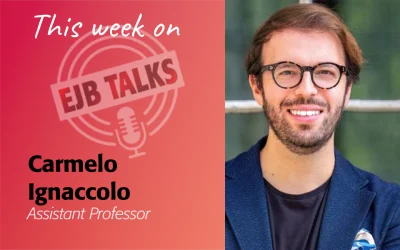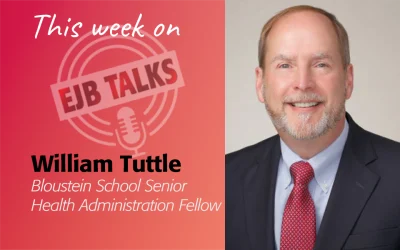The effects of COVID-19 on the economy will be deep and long-lasting. One of the more important impacts may be on housing markets. In this episode of EJB Talks, Stuart Shapiro has a revealing conversation with Assistant Professor Eric Seymour about the rental housing market and the looming eviction crisis. Professor Seymour talks about his research on predatory institutional landlords, including large motel conglomerates, and how these entities may exacerbate a potential housing crisis across the country.
Stuart Shapiro
Welcome to EJB Talks. I’m Stuart Shapiro, the Associate Dean of the Faculty at the Bloustein School. And the purpose of this podcast is to talk with my colleagues and our alumni about policy, planning, and health, the interaction between these issues, and how they affect people in New Jersey, the United States, and the world.
In keeping with the theme of the start of our second season, we’re talking with our new faculty. Today, I’m speaking with Professor Eric Seymour, who joined us last year, who researches housing. And teaches in our nationally-ranked urban planning program. Professor Seymour, thanks for joining us.
Eric Seymour
It’s my pleasure to join you.
Stuart Shapiro
Let’s start by talking a little bit about your research. Explain to our audience what investor landlords, one of the subjects of your research, are, and how they have proliferated over the past decade.
Eric Seymour
Certainly, I’d be happy to. So I should say that “investor landlords” is an encompassing term. Individuals can and do invest in rental housing. But often when we use this term investor landlord, particularly since the last financial crisis and last housing crisis, housing activists are often referring to institutional landlords. These larger entities that are often backed by private equity. They may be hedge funds, they may be real estate investment trusts, but you have these large financial institutions that are entering into the world of landlording.
So in 2008, you know, rewind back to the last major crisis in housing and employment facing the United States, there was a glut of single-family homes that had been repossessed by banks, by the federal government, Fannie Mae, Freddie Mac. And you had a particular felicitous opportunity for these investors who were looking for new investment vehicles. And so there was a growing demand for renting for people who had been foreclosed upon, for people who could no longer get a mortgage, because mortgage credit suddenly became extremely tight. And on the other hand, you have these investors purchasing these properties for rentals. So it was this supply/demand situation, creating this perfect context for the rise of the institutional landlord. And so these include Blackstone, who’s often most discussed in the national media and conversations about institutional landlords, which is this giant global private equity entity.
Stuart Shapiro
Great. Let me ask, I have to ask because it occurred to me as you were talking. Do we count Jared Kushner as an investor landlord?
Eric Seymour
Yeah, that’s a good question. And I also have to… you’re revealing my New Jersey ignorance. (laughter)
Stuart Shapiro
He’s from New Jersey! (laughter)
Eric Seymour
I know he’s from the state and he’s involved in a lot of what I believe to be high-end luxury real estate in some of these coastal areas and up in the city. I don’t know, I don’t think that he was involved in the types of activities I was describing. However, Steve Mnuchin, was deeply involved…
Stuart Shapiro
Ah, OK.
Eric Seymour
.. in these types of activities of buying single-family homes and renting them. In fact, there was a… not to give a nod to a rival podcast… Reveal had a very interesting segment about Mnuchin’s involvement in becoming an institutional investor in single-family homes after the last crisis.
Stuart Shapiro
Fascinating. I know Kushner is involved with stuff in Baltimore, but I’ve no idea whether it fits in this category or not. So why is the presence of these investor landlords a problem for lower and middle-income renters?
Eric Seymour
Sure. This is one of the comments I most frequently get from reviewers when I’m submitting papers, is that — I do have to add the caveat that not all investors are predatory actors — but there are certain characteristics of their business practices that you know can and do have negative consequences for those who are looking for secure rental housing.
And so, the contrast that is typically made in conversations about these institutional landlords is with the ma and pa or the mom and pop type landlord who maybe owns one. Maybe their first home that they’re renting out. If it’s a couple that’s moved out to the suburbs, and they have a property in the inner city. Or maybe they have a couple of properties and they’re going to use that rental revenue to retire. They have probably been renting their property to the same tenant for a long number of years. Maybe went to school together, or you know, their children went to school with a tenant, etc. There’s some type of a personal relationship. But with this shift to institutional landlords, these are entities that are, you know, out of state. They’re beholden to investors, shareholders, some of them are publicly traded. And so, they have been shown to be more likely to automate your eviction process.
So the first possible day that they can file an eviction they will do so. They’re less likely to work out some sort of arrangement with somebody who’s been in that property. And these entities are also more likely to find ways to maximize their profits. And so they are more likely to increase the rents year over year. They also have been shown to tack on a large number of fees and penalties for a variety of things, often erroneously, because they have this large portfolio they have to manage. And I don’t think that they really have the technology in place to adequately monitor it. Or at least from what I’ve seen in the anecdotal reporting about these, the situations of tenants reporting this type of activity. And you know, they’re not as.. they don’t seem to be as willing or able to maintain those properties. So your code enforcement activities as well. So people, on the one hand, you’re paying… you’re paying higher levels, higher levels go up year after year, you have these penalties and fees. But on the other hand, you know, you may have mold, insects, and other types of issues with the properties.
Stuart Shapiro
Right. The water is not running, or the stove doesn’t turn on or something like that, you’re less likely to get it fixed.
Eric Seymour
Exactly.
Stuart Shapiro
Gotcha. I was surprised to read in your recent article that this problem extends to motels. What do motels have to do with this?
Eric Seymour
So motels are not directly related to what’s happening with the single-family rentals and institutional investors. This is a different submarket or segment of the rental market.
Stuart Shapiro
I see.
Eric Seymour
It’s one that’s expanded as well since the last financial crisis. And motels have, in many metropolitan areas, become the housing of last resort, before folks become homeless or double up with friends and family or live in their car. And so I’ve been working on this project out in Las Vegas for the past couple of years, which was a departure from me from having studied Detroit and Buffalo for so long. And looking at evictions there over the past decade, I saw that there was this pretty substantial share of the activity concentrated in these, what they call weeklies. These are these extended-stay motel/hotel operations.
And so there’s a trade-off for the tenant, that they don’t have to have a down payment, like a full month in advance. They’re not subject to the same level of screening, but they’re actually paying pretty high rent week over week. Because… And so they might be able to manage that rent for a short period of time. But one life difficulty gets in the way. And you have to be out within five days.
Stuart Shapiro
Oh, boy. I see.
Eric Seymour
So there are very few protections for those renters.
Stuart Shapiro
I see. And the same types of actors that have seen the rental market as a possibility of seeing these for gain have also seen this market?
Eric Seymour
Yeah, absolutely. So there’s this one actor that I discussed in this paper that’s about to come out in Housing Policy Debate, called King Futt’s. And they’ve been in the motel operating business for a while. And this is something I’ve written about in Detroit as well. So understandably, a great deal of attention is paid to these big national behemoths, who swoop in and buy thousands of properties for a song. And are found to be associated with these kinds of troubling activities in terms of under maintenance and accelerated evictions. But they are often these fringe actors who use the crisis as an opportunity to expand the scale of their holdings.
And so in Detroit, I saw this in terms of people who had long been in the business of renting properties, without maintaining them, who now is able to build their… build out their holdings, expand their portfolio. And so we see something similar in Las Vegas with this King Futt’s who jumped into a different market because they’re able to buy all these properties very cheaply up in the last crisis.
Stuart Shapiro
I see. I do have to warn you, I am now going to refer to you as our King Futt’s expert at the Bloustein School. (laughter)
Let’s bring this up to our current crisis. We’ve tried to weave work into sort of what’s going on in the world. We’re now in the midst of really, what’s a recession that I think will be even larger than the 2008 one when all was is said and done. And of course, we’ve got the underlying pandemic. Is this creating a new housing crisis?
Eric Seymour
It is. I think it will be a very different housing crisis than the last one. It seems, you know, simply looking at things as they are right now, September 2020. Homeowners seem to have an adequate level of protection from being put out of their homes.
Stuart Shapiro
Okay.
Eric Seymour
And so many of the mortgages that are originated in the United States, they’re ultimately backed by the federal government because they’re sold on the secondary market. So Fannie Mae and Freddie Mac, which again, as of September 2020, are still under federal conservatorship. So the federal government has a heavy hand in what they can do in the mortgage market, in terms of authorizing forbearance programs and that type of thing. So homeowners aren’t being forgiven for what they’re not able to pay right now, but because of the nature of the mortgage market, and the structure of home financing through mortgages, they’re able to put those payments off into the future, extending the life of the loan.
Now, I do think that the situation is very different for renters. And I think that there is a looming eviction crisis unless the government steps in to backstop the rent that people aren’t able to pay. There’s an eviction moratorium in place where tenants don’t have to pay rent. But they aren’t being forgiven that rent. And so when it comes due on January 1, or whatever the date ultimately is, I just don’t see how without further intervention, you can avoid a national eviction crisis. Which can then lead to these types of transitions of the mom and pops who are struggling to pay their property taxes right now. They might lose their properties. And then you might see these opportunistic actors come in and pick up all of those homes.
Stuart Shapiro
I see. Yeah, we do read a lot about the eviction crisis. I know Trump tried to use some CDC powers to temporarily forestall that, but there were questions about the legality of that if I read it correctly.
Eric Seymour
I think that’s right. I think these landlord associations are questioning the legitimacy of the CDC being involved. But right, the eviction crisis is a public health crisis, because of the nature of the pandemic.
Stuart Shapiro
Mm-hmm.
Eric Seymour
And so you don’t want people to be put out of their homes to potentially communicate COVID-19.
Stuart Shapiro
So yeah, that does sort of bring us in a circle up to the pandemic that if we do see an eviction crisis, we’re likely to see an exacerbating of our health crisis.
Eric Seymour
Yes, that’s absolutely right. And so if people are being evicted and become mobile, and are more likely to be in some type of a congregate housing situation, whether it is a homeless encampment or doubling up, you’re going to exacerbate the spread of the coronavirus.
Stuart Shapiro
Right, especially as winter nears.
Eric Seymour
Exactly.
Stuart Shapiro
Yeah. Well, that’s cheerful, the… is there anything else, in sort of the broad area of housing policy or in your research that you’d like to highlight?
Eric Seymour
So I don’t necessarily like to always play this position. But sometimes I like to, again, coming to the coast, coming to New Jersey from the Rust Belt. There’s a lot of attention, justly and justifiably, paid to questions concerning gentrification. And that’s something that I am currently looking at, with Professor Kathe Newman, and Laura Nolan, our excellent, talented doctoral research assistant, looking at those issues in New Jersey. But there are pressing housing quality and affordability issues in places where rents are relatively inexpensive.
And so that’s something I’ve been looking at in terms of the intersection of housing and health. I just published a paper in Health & Place, looking at lead exposure, lead poisoning essentially, in these, you know, “low rent” homes in Detroit. You have a great deal of exploitation in these low-cost rental markets because of the constraint options for folks who maybe have an eviction history, which is going to prevent them from entering the mainstream rental market. They might not have that downpayment. And so, there are certainly people looking at these issues, but that’s something that through my work, I’ve been hoping to help contribute to the broader conversation of housing markets, housing policy, housing issues, and how they relate to health.
Stuart Shapiro
And I mean, you said the words “lead” and “Michigan” in the same sentence. I have to imagine that that ties in with Flint as well.
Eric Seymour
It does tie in. I mean, that’s a sort of a different scale of policy failure there. It’s not necessarily something related to the person who’s renting the home, right? That was an austerity fueled decision related to the state and the local government that has not been adequately addressed even though they did just announce a settlement with the city and its residents.
Stuart Shapiro
Yeah, it’s interesting. I mean, we always, you know, we think of housing as an issue and we think of health as an issue. And I think one thing your work highlights is that there is a very big overlap between them.
A big thank you, to you, for coming on the podcast this week. That’s been very, very educational for me. I know, and I’m sure for our listeners as well.
Eric Seymour
Thanks, Stuart. It was my pleasure to join you.
Stuart Shapiro
Also a big thank you to Amy Cobb and Karyn Olsen, our production team. We’ll be back next week with another conversation with another new faculty member at the Bloustein School. Until then, stay safe.




